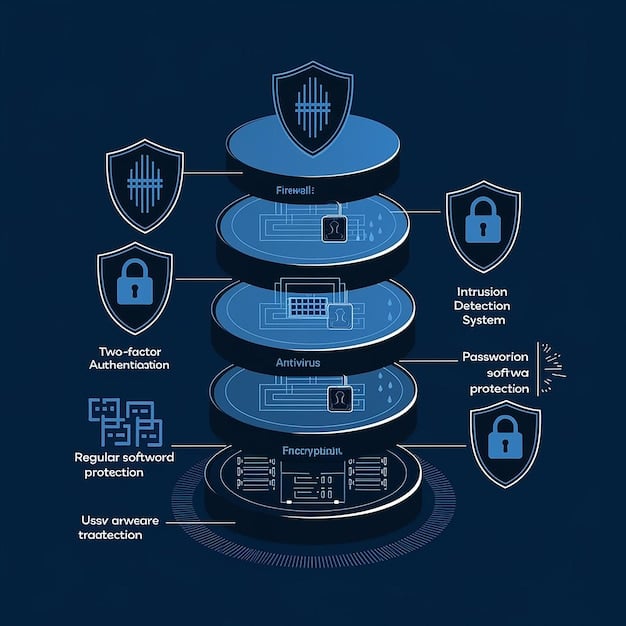Analyzing US Cybersecurity: International Impact of New Legislation

Analyzing the US Approach to Cybersecurity: How Will the New Legislation Impact International Relations? examines the latest US cybersecurity laws and their potential effects on global partnerships and security strategies.
The evolving landscape of digital threats necessitates a robust and adaptive cybersecurity framework. Analyzing the US Approach to Cybersecurity: How Will the New Legislation Impact International Relations? delves into the implications of recent legal changes on the nation’s foreign policy and international collaborations.
Understanding the Foundations of US Cybersecurity Strategy
The US cybersecurity strategy is built on a multilayered approach encompassing legislation, international cooperation, and technological innovation. This framework aims to protect critical infrastructure, data, and communications from cyberattacks originating both domestically and internationally.
To fully grasp the US approach, it’s essential to look at the laws shaping this strategy:
Key Legislations and Frameworks
Several key pieces of legislation form the backbone of US cybersecurity efforts. These laws address a range of issues, from data privacy to critical infrastructure protection.
National Institute of Standards and Technology (NIST) Framework
NIST has developed a voluntary framework that offers a common language to address and manage cybersecurity risk. It is widely used by organizations of all sizes and serves as a foundational guide for cybersecurity practices.
- Cybersecurity Information Sharing Act (CISA): CISA encourages the sharing of cyber threat information between the government and the private sector.
- Federal Information Security Modernization Act (FISMA): FISMA requires federal agencies to develop, document, and implement an agency-wide information security program.
- Gramm-Leach-Bliley Act (GLBA): GLBA includes provisions to protect consumers’ financial information held by financial institutions.

These laws and frameworks are continuously updated and adapted to address emerging threats and technological advancements. Understanding these foundations is crucial for analyzing the implications of new cybersecurity legislation on international relations.
The Core Elements of New Cybersecurity Legislation
Recent cybersecurity legislation introduces several key components aimed at strengthening national defenses and fostering international cooperation. These new laws cover a range of topics, from enhancing data protection to streamlining incident response.
The most important thing to keep in mind is:
Enhanced Data Protection Standards
New laws often increase the standards to protect private data, adding strict requirements for the collection, storage and sharing of that information. These standards aim to promote greater accountability and reduce the risk of data breaches.
Cyber Incident Reporting Requirements
To improve timely incident response, new legislation may require organizations to report cyber breaches to the government. This information can then be used to recognize trends, advise victims and improve overall cybersecurity.
- Increased Penalties for Cybercrimes: New legislation may increase penalties for cyber criminals, sending a powerful message that these crimes will not be tolerated.
- Improved Information Sharing: Legislation intended to promote greater sharing of threat intelligence seeks to create awareness and strengthen collective cyber defenses.
- Strengthened Critical Infrastructure Protection: New regulations also aim to ensure that critical infrastructure remains secure by requiring businesses to adopt stronger safeguards.
These changes reflect a growing consensus on the significance of cybersecurity and a commitment to taking strong steps to protect national interests and international partnerships.
Impact on US Foreign Policy Objectives
New cybersecurity legislation has considerable implications for US foreign policy objectives, impacting how the US engages with other nations on issues ranging from trade to defense. These legal changes can reshape diplomatic strategies and international collaborations.
The impact is diverse:
Promoting Global Cybersecurity Standards
The US endeavors to encourage the adoption of global cybersecurity rules to foster more effective cooperation in confronting cyber threats. These efforts aim to promote an even playing field and improve overall cybersecurity practices around the world.
Enhancing International Cooperation
Cybersecurity threats call for international cooperation, and new legislation can allow this by outlining the conditions for collaborative operations. This includes sharing of information, joint training exercises and coordinated reactions to cyberattacks.

These aims are crucial for keeping the US at the innovation vanguard while at the same time cultivating solid partnerships with allies in the face of evolving cyber threats.
Potential Challenges to International Relations
While new cybersecurity legislation is intended to boost cybersecurity, it also presents possible challenges to international relations. The enforcement of these laws may create diplomatic friction and trade obstacles.
The most important challenge is related to:
Data Sovereignty Concerns
Tensions will arise among countries, with each passing more laws regarding how personal data is handled. In some cases, this can result in data storage and processing requirements in the territory, which may conflict regulations in effect in other countries.
Trade and Economic Impacts
Cybersecurity can affect trade and economic connections, in which strict rules may function as trade restrictions. For instance, mandating the usage of particular security products might place overseas businesses at a disadvantage.
- Increased Surveillance Concerns: Stricter cyber laws could cause concerns that the US is expanding its surveillance powers internationally.
- Digital Protectionism: Laws focused on internal cybersecurity might unintentionally lead to digital protectionism to undermine international trade and cooperation.
- Risk of Retaliation: More aggressive cybersecurity practices may spark retaliatory actions from foreign nations, fueling an arms race in cyber space.
Navigating these issues necessitates delicate diplomacy and a dedication to openness and collaboration so that cybersecurity is enhanced without undermining reciprocal trust and cooperation.
Case Studies: Impact of Previous Legislation on Global Cybersecurity
Looking at case studies related to former legislation gives knowledge on the possible repercussions that new cybersecurity rules might have on the global cybersecurity picture. This examination shows both wins and areas needing improvement.
Examples include:
The Impact of the Cybersecurity Information Sharing Act (CISA)
CISA has been instrumental in improving information sharing between the public and private sectors. However, it also raises concerns about privacy and the extent of government surveillance. Analyze how CISA has impacted international organizations.
The Role of the Federal Information Security Modernization Act (FISMA)
FISMA sets standards for federal data security, which has been used as a model by other countries hoping to strengthen their governmental cybersecurity. Talk about how effective FISMA has been at encouraging conformity and safety in the global IT environment.
These case studies highlight the actual impact that cybersecurity legislation has on international relations in specific situations. They illustrate not only accomplishments but also problems that must be resolved when establishing and putting similar laws into practice.
Future Trends and Predictions
Looking ahead, a number of trends and projections imply that the US’s strategy to cybersecurity is always evolving. These trends will mold new rules and have an impact on international relations.
Consider the topics below:
The Rise of Artificial Intelligence (AI) in Cybersecurity
Artificial intelligence is expected to revolutionize cybersecurity by improving threat protection and incident resolution. Explore how AI can be included in forthcoming legislation and what role international standards will play in guaranteeing the technology’s ethical and fair deployment.
The Evolution of Quantum Computing
With quantum computers’ decryption capabilities increasing, cybersecurity methods must adapt. Discuss what implications these advancements might have and how the US should collaborate with other countries to prepare for quantum-related cybersecurity difficulties.
- Greater Emphasis on Supply Chain Protection: Future laws may give priority to making supply chains more secure by requiring businesses to thoroughly assess and reduce supplier risks.
- Increased Focus on IoT Security: As the number of Internet of Things (IoT) devices grows, legislation will need to tackle the problems these devices pose with safety, concentrating on standardization and certification.
- Advanced Public-Private Collaborations: Legislation might push for more advanced collaboration between the government and private sector to establish threat intelligence and strengthen cyber incident responses.
Acknowledging these possibilities and proactively preparing for them will guarantee that the US continues to be a leader in cybersecurity and cultivates positive relationships based on trust and mutual security.
| Key Point | Brief Description |
|---|---|
| 🛡️ Enhanced Data Protection | New laws set stricter rules for collecting, storing, and sharing private data. |
| 🤝 International Cooperation | New legislation supports collaborative cybersecurity operations with international partners. |
| 🌐 Global Standards | The US promotes global cybersecurity standards for greater international partnership. |
| 🤖 AI in Cybersecurity | AI is expected to transform cybersecurity, enhancing threat detection and response. |
FAQ
▼
CISA is a US law that promotes information sharing about cyber threats between the government and private companies to enhance national cybersecurity defenses.
▼
New cybersecurity laws can affect trade by setting strict standards that may act as trade barriers, especially concerning data handling and technology requirements.
▼
Data sovereignty concerns arise when US laws require data to be stored and processed within the US, impacting other countries with different data protection rules.
▼
Stricter laws can increase surveillance, raising concerns about the balance between national security and individual privacy rights both domestically and internationally.
▼
The US promotes global standards by advocating for common cybersecurity practices and norms, aiming to foster international cooperation and improve worldwide digital security.
Conclusion
Analyzing the US approach to cybersecurity, particularly the impact of new legislation on international relations, reveals a complex interplay of legal, political, and technological factors. While intended to strengthen national and international security, these laws also pose challenges in terms of data sovereignty, trade, and privacy. Navigating these complexities will require careful diplomacy and a commitment to international cooperation to ensure that cybersecurity efforts enhance, rather than undermine, global stability and trust.





